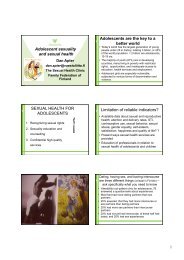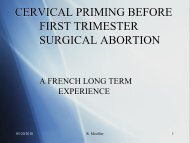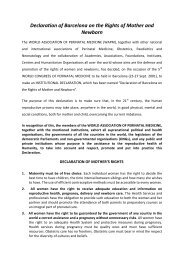Journal of Contraception Reproductive Health Care - The European ...
Journal of Contraception Reproductive Health Care - The European ...
Journal of Contraception Reproductive Health Care - The European ...
Create successful ePaper yourself
Turn your PDF publications into a flip-book with our unique Google optimized e-Paper software.
<strong>The</strong> 8th Congress <strong>of</strong> <strong>The</strong> <strong>European</strong> Society <strong>of</strong> <strong>Contraception</strong> Abstracts <strong>of</strong> Invited Speakers<br />
IS-17<br />
Ethical and global aspects <strong>of</strong> abortion<br />
H. Goldstein<br />
Copenhagen, Denmark<br />
Abortion, legal as well as illegal, has been known from ancient times. Probably since then pros and cons have been debated, and<br />
political as well as religious systems have stated their points <strong>of</strong> view very <strong>of</strong>ten, also in recent decades.<br />
For several decades a variety <strong>of</strong> Western societies have allowed abortion until a certain number <strong>of</strong> gestational weeks. <strong>The</strong> ethical<br />
questions have been debated very strongly, and no consensus is found by all political directions. <strong>The</strong> practice <strong>of</strong> legal abortion<br />
may vary from country to country, although the ethical problems are the same: Is the medical doctor a murderer? Has the fetus<br />
in utero the same legal status – and moral value – as a full born infant? Does the pregnant woman decide alone, if she wants the<br />
child, or does the father-in-future have some influence? Does legal and illegal abortion influence the global demographic situation?<br />
Or can abortion be used as a tool in order to change a demographic situation? May legal abortion be used as a tool if<br />
parents want a boy or a girl – after ultrasound examination?<br />
IS-18<br />
Abortion; influencing politics<br />
M.M. Lech<br />
Fertility and Sterility Research Center, Warsaw, Poland<br />
Abortion is a response to unwanted pregnancy, and is a consequence <strong>of</strong> poor sexual education and poor (or unavailable) family<br />
planning services. As it is well known, yearly number <strong>of</strong> abortion all over the world, approach the number <strong>of</strong> 50 million. 40%<br />
<strong>of</strong> them are illegal and unsafe. Everyday more than 200 women die due to unsafe/illegal abortions. Legalisations <strong>of</strong> abortions<br />
make these procedures safes, save women’s lives and diminish indicators <strong>of</strong> maternal mortality. Restrictive abortion laws means;<br />
illegal abortions, creation <strong>of</strong> abortion-underground, high number <strong>of</strong> unsafe abortions, woman’s mortality and morbidity, criminalization<br />
<strong>of</strong> the society, and even infanticide.<br />
Abortion law is the most influent factor <strong>of</strong> availability and accessibility <strong>of</strong> abortions in Europe. Abortion laws in Europe vary<br />
from the complete prohibition, in Malta, and availability <strong>of</strong> abortion only in case <strong>of</strong> endangered (by pregnancy) life <strong>of</strong> the<br />
women, in Ireland and Poland, to ‘‘abortion on request’’ in most <strong>of</strong> the <strong>European</strong> countries.<br />
In reality, restrictive abortion law in the certain country does not mean ‘‘abortion-free-country’’. For example, <strong>of</strong>ficial data on<br />
number <strong>of</strong> abortions in Poland is less than 200 per year (means 0.022 per thousand women in the age <strong>of</strong> 15–49), but in reality,<br />
estimated numbers <strong>of</strong> abortion exceed 50 thousand abortions per year. Restrictive abortion law in Poland means also ‘‘safe abortion<br />
services availability for well-<strong>of</strong>f women only’’. <strong>The</strong> fight for the contemporary and democratic abortion law (similar to<br />
abortion laws in most <strong>of</strong> the <strong>European</strong> countries) is one <strong>of</strong> the very hot points <strong>of</strong> politics in Poland. Some <strong>of</strong> groups <strong>of</strong> society,<br />
woman’s right lobby, NGO’s and some <strong>of</strong> the health pr<strong>of</strong>essionals are trying to influence politics by; raising awareness, monitoring<br />
and initiating activities concerning reproductive health/rights and women’s rights in the community, initiating media<br />
campaigns (through reports, press conferences, fact sheets, press releases, NGO’s bulletins, open letters etc) on legalization <strong>of</strong><br />
abortion and introducing sex education at schools, advocating for implementation <strong>of</strong> the commitments made by the Government<br />
during the international conferences (Cairo Conference on Population and Development, Beijing Fourth World Conference on<br />
Women), formation <strong>of</strong> various national and international networks and coalitions (including the Polish Committee <strong>of</strong> NGO’s-<br />
Beijing ’95), promoting international standards concerning human rights in the area <strong>of</strong> women’s reproductive health and rights.<br />
20 <strong>The</strong> <strong>European</strong> <strong>Journal</strong> <strong>of</strong> <strong>Contraception</strong> and <strong>Reproductive</strong> <strong>Health</strong> <strong>Care</strong>








